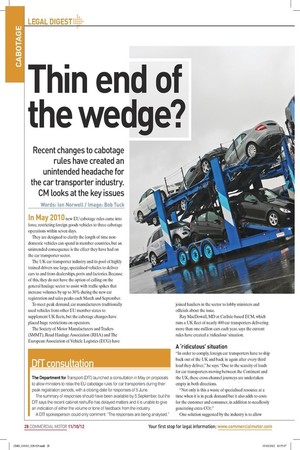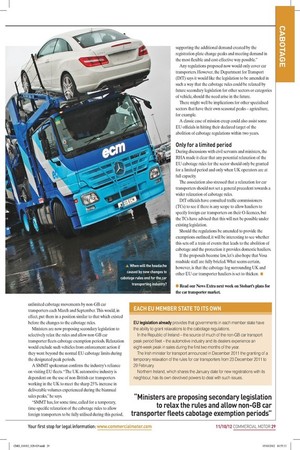Thin end of the wedge?
Page 22

Page 23

If you've noticed an error in this article please click here to report it so we can fix it.
Recent changes to cabotage rules have created an unintended headache for the car transporter industry. CM looks at the key issues
Words: Ian Norwell / Image: Bob Tuck
In May 2010 new EU cabotage rules came into force, restricting foreign goods vehicles to three cabotage operations within seven days.
They are designed to clarify the length of time nondomestic vehicles can spend in member countries, but an unintended consequence is the effect they have had on the car transporter sector.
The UK car transporter industry and its pool of highly trained drivers use large, specialised vehicles to deliver cars to and from dealerships, ports and factories. Because of this, they do not have the option of calling on the general haulage sector to assist with traffic spikes that increase volumes by up to 30% during the new car registration and sales peaks each March and September.
To meet peak demand, car manufacturers traditionally used vehicles from other EU member states to supplement UK fleets, but the cabotage changes have placed huge restrictions on operators.
The Society of Motor Manufacturers and Traders (SMMT), Road Haulage Association (RHA) and The European Association of Vehicle Logistics (ECG) have joined hauliers in the sector to lobby ministers and officials about the issue.
Ray MacDowall, MD at Carlisle-based ECM, which runs a UK fleet of nearly 400 car transporters delivering more than one million cars each year, says the current rules have created a ‘ridiculous’ situation.
A ‘ridiculous’ situation
“In order to comply, foreign car transporters have to ship back out of the UK and back in again after every third load they deliver,” he says. “Due to the scarcity of loads for car transporters moving between the Continent and the UK, these cross-channel journeys are undertaken empty in both directions.
“Not only is this a waste of specialised resource at a time when it is in peak demand but it also adds to costs for the customer and consumer, in addition to needlessly generating extra CO2.” One solution suggested by the industry is to allow unlimited cabotage movements by non-GB car transporters each March and September. This would, in effect, put them in a position similar to that which existed before the changes to the cabotage rules.
Ministers are now proposing secondary legislation to selectively relax the rules and allow non-GB car transporter fleets cabotage exemption periods. Relaxation would exclude such vehicles from enforcement action if they went beyond the normal EU cabotage limits during the designated peak periods.
A SMMT spokesman confirms the industry’s reliance on visiting EU fleets. “The UK automotive industry is dependent on the use of non-British car transporters working in the UK to meet the sharp 25% increase in deliverable volumes experienced during the biannual sales peaks,” he says.
“SMMT has, for some time, called for a temporary, time-specific relaxation of the cabotage rules to allow foreign transporters to be fully utilised during this period, supporting the additional demand created by the registration plate change peaks and meeting demand in the most flexible and cost-effective way possible.” Any regulations proposed now would only cover car transporters. However, the Department for Transport (DfT) says it would like the legislation to be amended in such a way that the cabotage rules could be relaxed by future secondary legislation for other sectors or categories of vehicle, should the need arise in the future.
There might well be implications for other specialised sectors that have their own seasonal peaks – agriculture, for example.
A classic case of mission creep could also assist some EU officials in hitting their declared target of the abolition of cabotage regulations within two years.
Only for a limited period
During discussions with civil servants and ministers, the RHA made it clear that any potential relaxation of the EU cabotage rules for the sector should only be granted for a limited period and only when UK operators are at full capacity.
The association also stressed that a relaxation for car transporters should not set a general precedent towards a wider relaxation of cabotage rules.
DfT officials have consulted traffic commissioners (TCs) to see if there is any scope to allow hauliers to specify foreign car transporters on their O-licences, but the TCs have advised that this will not be possible under existing legislation.
Should the regulations be amended to provide the exemptions outlined, it will be interesting to see whether this sets off a train of events that leads to the abolition of cabotage and the protection it provides domestic hauliers.
If the proposals become law, let’s also hope that Vosa roadside staff are fully briefed. What seems certain, however, is that the cabotage fog surrounding UK and other EU car transporter hauliers is set to thicken. n l Read our News Extra next week on Stobart’s plans for the car transporter market.











































